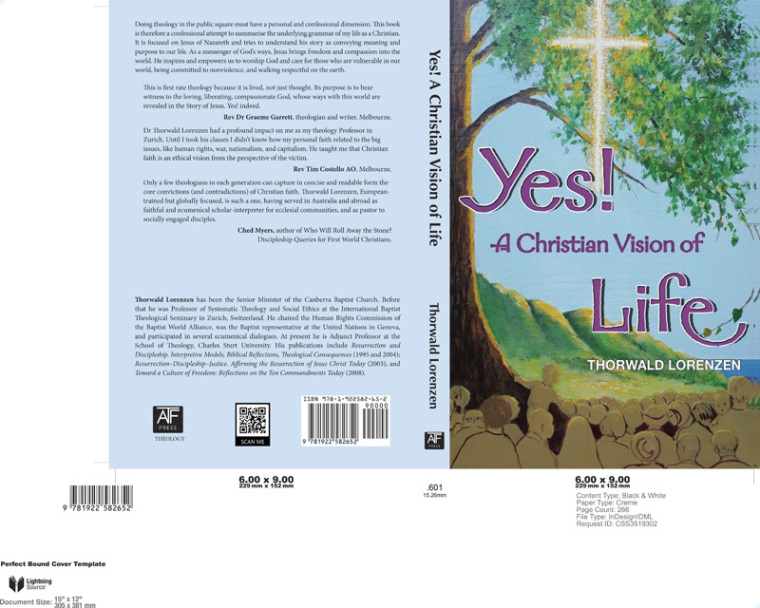
Confessional theology
This book is about theology, but it is not a theological textbook. It relates the great challenges of human life—the reality and content of faith, the experience of suffering and evil, the confronting reality of death—to the resources of the Christian faith.
Thereby I follow the biblical invitation of always being “ready to make your defence to anyone who demands from you an accounting for the hope that is in you” (1 Peter 3:15). Yet, the confession needs to reflect the nature of what we are talking about. It therefore cannot be coercive or authoritarian. It needs to be honest, transparent, and respectful. It must be done with “gentleness and reverence” (1 Peter 3:16).
Jesus
The central concern of the book is to explain that for Christians, God is revealed in the story of Jesus and in the power of God’s Spirit. God reveals who God is and what God does in Jesus of Nazareth—his life, death, and resurrection.
Although each believer has her or his own and unique experience of God, what all Christians have in common, is our focus on Jesus of Nazareth. He, Jesus Christ, is the source of the church; he is the mega story of the Christian Bible; he is the canon of Christian tradition; he is the content of Christian faith. One of the earliest Christian confessions was: “Jesus is Lord!” (1 Corinthians 12:3).
In this book I have spoken of Jesus Christ as God’s self-revelation in four ways.
Revelation: In the life, death and resurrection of Jesus, God reveals God’s self as compassionate parent. God restores what is broken, saves what is lost, heals what is sick, and liberates what is oppressed. An early Christian confession said that “God is love!” (1 John 4:7–12). Christians therefore believe that nothing “in all creation, will be able to separate us from the love of God in Christ Jesus our Lord” (Romans 8:39).
Reconciliation: By raising Jesus from the dead, God did something for us, that needed to be done, but that we could not do by and for ourselves. God reconciled the world with God’s self. God was “in Christ . . . reconciling the world to himself” (2 Corinthians 5:17–21).
Role Model: Jesus serves as role model for those who believe in him and follow him. Through the ministry of the Holy Spirit, the Jesus story shapes the identity of Christians.
Judge: There is meaning in history because Jesus Christ will ‘come again in glory to judge the living and the dead’ (The Ecumenical Christian Creed of 381 AD).
Human Rights
Jesus did not die of old age or of a heart attack. He was opposed, tortured, sentenced, and executed as a criminal because he was passionate about making human life fully human! That brings us to the struggle for human rights. Jesus carried forward the ancient Jewish tradition that believing in God means to do justice: “He has told you, O mortal, what is good; and what does the LORD require of you but to do justice, and to love kindness, and to walk humbly with your God?” (Micah 6:8).
In our time, human rights define what justice means in everyday life. And human rights are the only court of appeal for those who have no clout and who do not live on the sunny side of life.
Christians are concerned for the formation and implementation of human rights because it coheres with their understanding of life.
· Humans are graced with the promise of being the “image of God” (Genesis 1:26–7), and humans should not do violence to each other “for in his own image God made humankind” (Genesis 9:6).
· There is therefore a biblical imperative that justification includes justice.
· And Christians confess that Jesus of Nazareth was not only a real human person, but also the true human being.
In two chapters—chapters 8 and 9—the book discusses the relationship between Christian faith and human rights. It emphasises that especially the Anabaptists and dissidents of 16th and 17th century central Europe have been influential in shaping modern human rights. They emphasised separation of church and state, freedom of conscience, and religious liberty.
At the same time, Christians also have a definite perspective on human rights:
· They understand freedom not as individualistic entitlement but as a community experience. We are not free until all of us are free.
· They emphasise the transformative power of faith in Christ. Where Christ is honoured equality becomes a historical reality: “There is no longer Jew or Greek, there is no longer slave or free, there is no longer male and female; for all of you are one in Christ Jesus” (Galatians 3:28).
· They emphasis nonviolence and thereby contribute to fulfill the aim of the United Nations “to save succeeding generations from the scourge of war” (Charter of the United Nations).
Outlook
With war and oppression raging in Ukraine, Myanmar, and Yemen, with the Intergovernmental Panel on Climate Change just releasing a new and frightening report about the future of climate change (6th Assessment Report on impacts, vulnerability, and adaptation), about the state of the oceans, and the dyeing of species, following Jesus today means to place our trust in God, work for justice, and walk softly on the earth.
Purchasing:
Online: ATF Press Bookshop.
In UK: Gazelle Book Services.
In US: Ian Stevens Distribution.

Thorwald Lorenzen was the Senior Minister of the Canberra Baptist Church. Before that he was Professor of Systematic Theology and Social Ethics at the International Baptist Theological Seminary in Zurich, Switzerland. He chaired the Human Rights Commission of the Baptist World Alliance, was the Baptist representative at the United Nations in Geneva, and participated in several ecumenical dialogues. At present he is Adjunct Professor at the School of Theology, Charles Sturt University. His publications include Resurrection and Discipleship (1995 and 2004); Resurrection – Discipleship – Justice (2003); Toward a Culture of Freedom: Reflections on the Ten Commandments Today (2008); Yes! A Christian Vision of Life (2021).